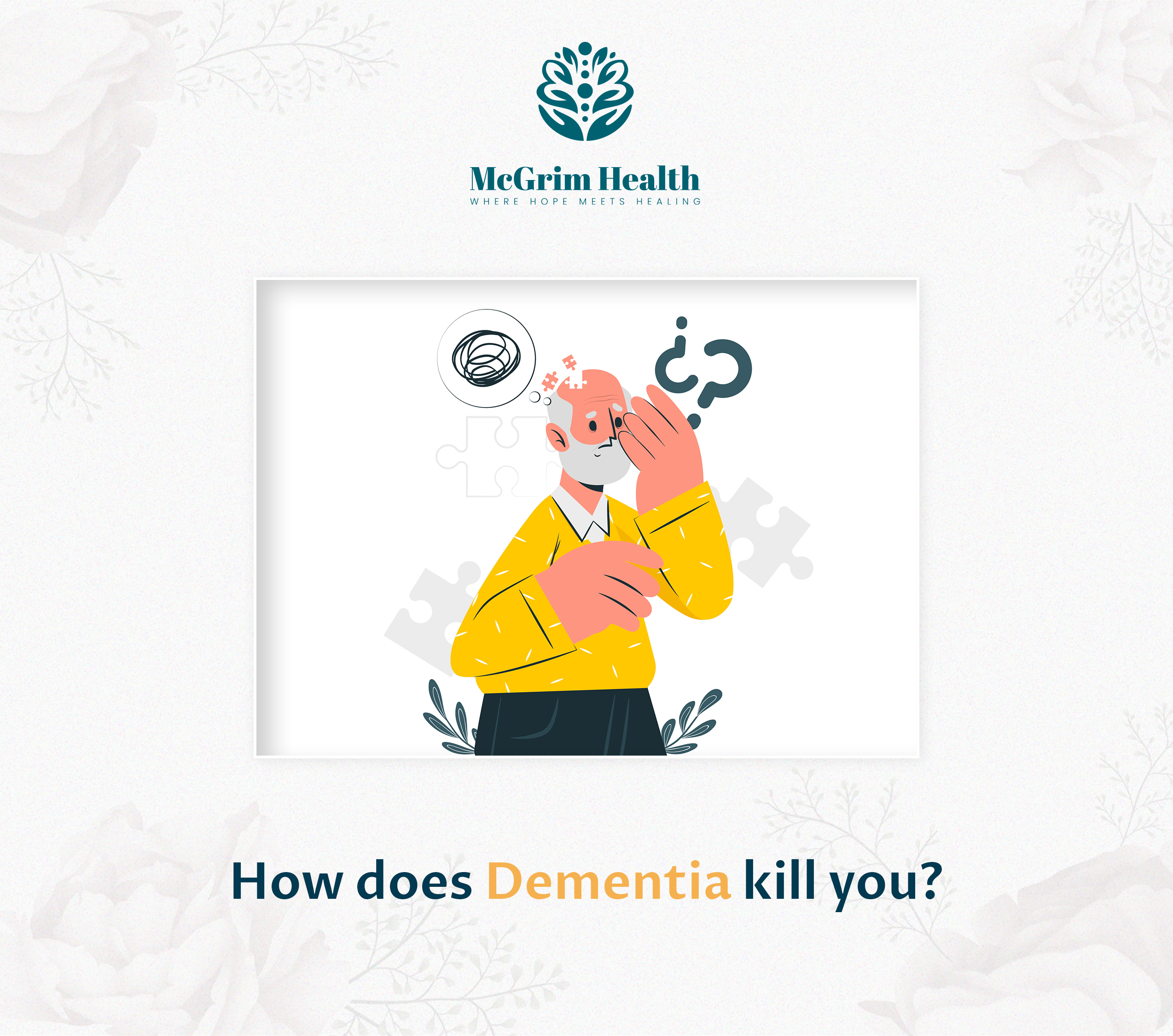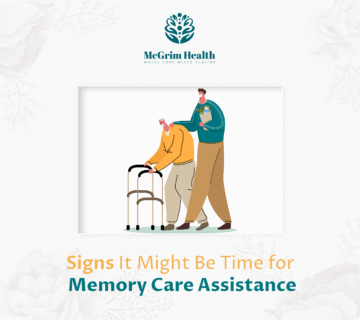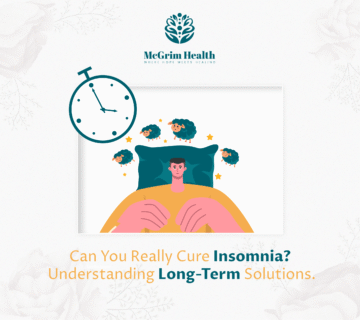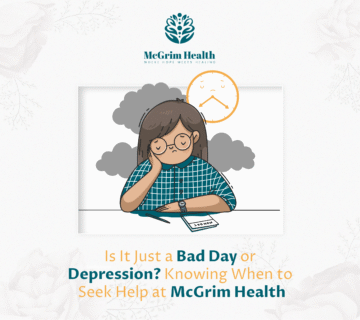Dementia, affecting the lives of many around the world, is a brain disorder that gets worse over time.
It can alter a person’s life dramatically, slowly impacting their memory, clear thinking, and daily task performance.
But how does dementia kill you? A fact unknown to many is that dementia can indeed be fatal, often through intricate and varied ways.
Below, we delve into how dementia can lead to death, its phases, and the signs pointing to the final stages.
McGrim Health specializes in dementia care, offering personalized solutions to improve well-being. Visit their website to explore treatments.
Understanding Dementia
Before discussing “how does Dementia kill you”, we should first define it.
Dementia affects millions and is not a normal part of aging. Numerous individuals in their 90s stay symptomless.
Alzheimer’s, the most common type, impacts about five million Americans over 65. Other forms include Lewy body and vascular dementia.
These conditions disrupt memory, thinking, and behavior. A third of those over 85 may have dementia. But, it’s not a certainty of aging.
The Stages of Dementia and How It Progresses
Dementia has various stages, each characterized by increasing symptoms and worsening brain function.
Early Stage
At first, dementia can mainly touch on memory and thought processes. Individuals might misplace memories, lose track of the hours, or find decision-making tough.
It usually doesn’t cause serious health issues. But, it can worsen the disease.
Middle Stage
As dementia advances, it begins to impact physical skills. People may find balancing, coordinating movements, and performing motor tasks difficult.
They may also get mixed up about their environment. Although this stage isn’t deadly by itself, it raises the chance of mishaps and injuries which could potentially turn fatal.
Late or End Stage Dementia
The final phase of dementia can be truly critical. Typically, those struggling are confined to bed, and not able to do simple tasks like eating or swallowing on their own. Communication becomes a challenge and they may forget familiar faces.
At this point, dangers like infections, lack of movement, and the struggle to swallow sustenance often lead to life’s end.
In patients with other conditions, like end-stage dementia and Down syndrome, dementia can progress even faster. Their ability to fight infections may be compromised earlier.
What Kills Neurons?
Understanding how dementia kills you starts with the destruction of neurons. Neurons in the brain help us think, move, and function by transmitting signals.
In dementia, neurons die due to abnormal protein buildup, lack of oxygen to brain tissues, or factors like trauma or strokes.
As neurons die, the brain’s ability to control essential bodily functions weakens, leading to complications that ultimately cause death.
How Does Dementia Kill You?
Right now, let’s confront the main issue, how does dementia kill you? Dementia itself isn’t a direct killer. Yet, it harms vital functions, raising the death risk. The disease damages vital brain cells, called neurons. This decline leads to serious, often fatal, complications.
Aspiration Pneumonia
Dementia often leads to death by aspiration pneumonia. As the brain worsens, patients struggle to swallow. It allows food, liquids, or saliva to enter the lungs, causing infections.
Such pneumonia is common in late-stage dementia. There’s a strong link between Alzheimer’s and aspiration pneumonia. Severe dementia often causes fatal infections. A particularly lethal culprit tops the list.
Sepsis
Sepsis, a serious concern, happens among dementia patients. It typically strikes those in the final stages, weakened by their condition or confined to bed.
The body can’t fight off infections, including sepsis related to dementia, causing it to spread fast. It can damage vital organs, causing them to fail. It can even lead to tragic losses.
Seizures
Seizures can occur in later-stage dementia patients. They’re rarely fatal but still pose serious risks. A weakened brain makes recovery difficult, making each seizure potentially dangerous.
As dementia progresses, patients become more vulnerable and less resilient.
Breathing Problems
Pulmonary failure is a top contributor to death. As a case in point, observe Lewy body dementia. Those with this condition can experience severe breathing issues as they approach the end of their journey.
Breathing problems often connect to Lewy body dementia problems. It’s due to weaker breathing muscles.
Organ Failure
Dementia affects more than just the mind. It disrupts vital functions like breathing and digestion and can lead to organ failure.
How People Die from Alzheimer’s and Other Types of Dementia?
Alzheimer’s is a frequent kind of mental deterioration. Similar to other dementias, it commonly ends the same way. So, how do we tell if a person with dementia is passing away from Alzheimer’s or another type? Those with Alzheimer’s and other dementias mainly die from:
- Inability to move
- Infections
- Failure of vital body functions
The endpoints are often severe mental and physical weakening. A common cause of Alzheimer’s death is an inability to fend off infections.
How Do You Know a Dementia Patient is Dying?
As dementia progresses, recognizing its final stages is crucial but challenging. This uncertainty affects both the person with dementia and their caregivers.
Some symptoms may signal that death is near. But, dementia’s unpredictability can cause distress. Caregivers must navigate this mix of awareness and uncertainty.
Signs a Dementia Patient Is Dying
It’s vital to identify the signs a dementia patient is dying for essential support and calm. Critical signs consist of:
- Loss of Mobility: The person might be unable to move or stay in bed.
- Difficulty Swallowing: They may struggle, putting aspiration pneumonia at risk.
- Severe Weight Loss: Not eating or drinking causes weight loss and dehydration.
- Changes in Breathing: Breathing may become labored or stop temporarily.
- Unresponsiveness: The patient might stop talking or reacting, indicating body shutdown.
These signs show the body can’t sustain itself, signaling imminent death.
Can People with Dementia Read?
Many wonder, can dementia patients read? In the initial and middle phases, those with dementia can read. Yet, understanding what’s written might be hard.
As dementia progresses to later stages, reading can become exceedingly troublesome due to decreasing cognitive skills. The inability to understand written info signifies a step further into the disease.
How to Prevent Dementia?
There’s no certain strategy to avoid dementia. But, certain lifestyle adjustments could soften your risk. Here are some tips:
- Exercise Regularly: Good blood flow is key for brain health. It reduces dementia risks linked to blood vessel issues. Also, it improves mental sharpness by delivering nutrients to the brain.
- Consume a Nutritious Diet: Fruits, cereals, and proteins enhance cognitive function. A diet rich in these enhances thinking and memory.
- Keep Your Brain Active: Take part in reading, mind games, or other diversions.
- Socialize: Regular contact with friends helps maintain thinking skills.
- Avoid Smoking and Limit Alcohol: Both increase dementia risk. Staying healthy can prevent or slow down dementia.
Overall, a healthy brain and body reduce dementia risk.
Conclusion
To sum up, how does dementia kill you? Dementia doesn’t kill a person directly. Dementia can cause life-threatening issues like organ failure and infection.
It impairs vital brain functions. This results in our body’s gradual shutdown. If we can identify dementia’s stages and what leads to death, caregivers can prepare better and offer more effective care.
While we don’t yet have a cure for dementia, noticing it early on and changing the way we live can slow it down and enhance life’s quality.
Knowing more about dementia’s lethal effects can help. It matters to know how Alzheimer’s patients die and to spot signs of dying in dementia patients.
Patients and their caregivers alike can benefit from this understanding. If we focus on stopping it before it starts and catching it early, we might lessen this disease’s massive effects later on.
FAQs
What stage of dementia is sleeping all the time?
In the later stages of dementia, including end-stage dementia sleeping all time. It usually happens when the brain is more damaged and can’t control sleep patterns well.
Does dementia cause seizures?
Yes, dementia can lead to seizures, especially in later stages. These seizures happen due to brain changes caused by advancing dementia.
Can dementia be cured?
Dementia is still without a cure, despite ongoing research. Treatments now only manage symptoms and slow progression. Scientists are looking for breakthroughs. But for now, options are limited to slowing cognitive decline.





No comment